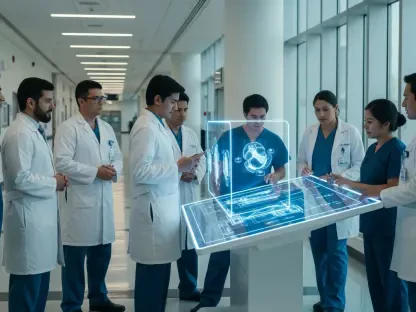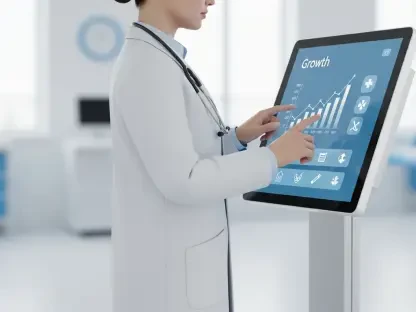In an era where healthcare faces unprecedented demands, digital transformation stands as a beacon of hope for improving patient outcomes and operational efficiency. With global health systems grappling with rising costs and complex care needs, a staggering statistic emerges: over 70% of healthcare providers struggle to adopt advanced technologies due to resource constraints, setting the stage for a groundbreaking development from one of the industry’s most trusted names, as Mayo Clinic unveils a pioneering initiative designed to bridge this critical gap and reshape the future of medical care.
The Digital Transformation of Healthcare: An Industry Overview
The healthcare sector is undergoing a profound shift, driven by the rapid integration of digital tools and innovative technologies. From telemedicine to wearable devices, the industry is embracing solutions that enhance accessibility and streamline processes. This transformation is not merely a trend but a necessity, as aging populations and chronic disease burdens push systems to their limits, demanding smarter ways to deliver care.
At the heart of this evolution lies the power of artificial intelligence (AI) and data analytics, which are redefining clinical decision-making and administrative efficiency. AI-driven diagnostics can predict patient outcomes with remarkable accuracy, while data platforms optimize hospital workflows, reducing wait times and costs. Key segments like predictive modeling, real-time monitoring, and personalized medicine are gaining traction, offering tailored solutions to complex health challenges.
Major players such as Epic Systems, Cerner, and IBM Watson Health are shaping this landscape, alongside technological advancements like cloud computing and machine learning. Collaboration has become a cornerstone of progress, with partnerships between tech firms, research institutions, and providers accelerating innovation. As digital adoption grows, the industry recognizes that shared expertise and resources are vital to overcoming barriers and ensuring equitable access to cutting-edge care.
Unveiling Mayo Clinic Platform_Insights: A Game-Changer
Core Features and Mission of the Program
On November 3, 2025, Mayo Clinic introduced Platform_Insights, a transformative program under its broader digital health platform. This initiative aims to empower healthcare organizations worldwide by providing access to advanced AI tools, data-driven insights, and clinical expertise. Regardless of an organization’s size or technological capacity, the program seeks to level the playing field, enabling providers to tackle modern challenges with confidence.
The mission of Platform_Insights centers on simplifying the integration of AI into medical practice. By offering guided support and proven solutions, it helps providers navigate the complexities of digital tools, ensuring that technology enhances rather than hinders care delivery. The ultimate goal is to improve patient outcomes through informed decision-making and streamlined operations.
A distinctive aspect of this program is its emphasis on humanizing technology. It prioritizes patient experience by ensuring that digital solutions align with clinical needs and ethical standards. This focus positions the initiative as a catalyst for meaningful change, addressing both the technical and humanistic dimensions of healthcare innovation.
Data Powerhouse: Leveraging Mayo Clinic Platform_Connect
Central to the program’s capabilities is Mayo Clinic Platform_Connect, a vast global health data network that collaborates with academic research partners. This infrastructure houses an extraordinary 26 petabytes of clinical data, encompassing over 3 billion lab tests, 1.6 billion clinical notes, and 6 billion medical images. Such a comprehensive repository provides a robust foundation for developing and validating innovative care solutions.
This data network enables the creation of tools that address a wide spectrum of medical conditions, from rare diseases to common ailments. By leveraging de-identified datasets, Platform_Connect supports the design of AI models that predict trends, identify risks, and recommend treatments with precision. The scale of this resource underscores Mayo Clinic’s commitment to evidence-based advancements.
Beyond raw numbers, the network fosters collaboration across borders, connecting health systems and researchers to share insights. This collaborative approach ensures that solutions developed through Platform_Insights are not only cutting-edge but also broadly applicable, addressing diverse patient needs and regional disparities in care access.
Challenges in Adopting AI and Digital Tools in Healthcare
Despite the promise of digital tools, significant hurdles impede their widespread adoption in healthcare. High costs of implementation often deter smaller organizations, while the complexity of AI systems requires specialized expertise that many providers lack. These barriers create a digital divide, leaving some facilities unable to benefit from technological progress.
Rural and under-resourced hospitals, in particular, face challenges in modernizing their operations. Without adequate funding or technical staff, these organizations risk falling behind, exacerbating inequities in patient care. The gap between tech-savvy institutions and those struggling to adapt highlights a pressing need for accessible solutions.
Platform_Insights addresses these obstacles by offering cost-effective pathways and expert guidance for integration. By simplifying the adoption process and providing tailored support, the program enables even the most resource-limited providers to leverage AI and data analytics. This approach not only democratizes access but also fosters a more inclusive healthcare ecosystem.
Navigating the Regulatory and Ethical Landscape of Healthcare AI
The integration of AI in healthcare operates within a stringent regulatory framework, designed to ensure patient safety and data security. Compliance with standards set by bodies like the FDA and HIPAA remains paramount, as breaches or misuse of sensitive information can have severe consequences. Navigating this landscape requires meticulous attention to legal and ethical considerations.
Mayo Clinic demonstrates a strong commitment to responsible AI development through Platform_Insights, adhering to industry benchmarks for privacy and accountability. The program prioritizes transparency in how data is used and ensures that solutions meet rigorous safety criteria. This dedication builds trust among providers and patients alike, reinforcing the credibility of digital interventions.
Balancing innovation with regulation poses a unique challenge, as overly restrictive policies can stifle progress. Platform_Insights plays a pivotal role by advocating for ethical practices while pushing the boundaries of technology. By aligning with best practices, it helps shape a future where advancements in care delivery coexist with unwavering standards of medical integrity.
The Future of Healthcare: AI, Collaboration, and Patient-Centered Innovation
Looking ahead, AI is poised to redefine healthcare through predictive analytics, automated workflows, and personalized treatments. Emerging trends point toward greater integration of data-sharing ecosystems, where health systems collaborate to pool resources and insights. Such networks promise to accelerate the development of solutions that address global health challenges.
The democratization of advanced tools stands as another critical direction, ensuring that innovations benefit a wider audience. Programs like Platform_Insights are instrumental in this shift, positioning Mayo Clinic as a leader in fostering inclusive growth. By connecting innovators and providers, the initiative paves the way for scalable, impactful change across diverse settings.
Economic and technological factors will continue to influence the trajectory of these efforts. Sustained investment in digital infrastructure, alongside policies that encourage collaboration, will determine the long-term success of such programs. Ultimately, the focus remains on enhancing patient outcomes, ensuring that technology serves as a tool for compassionate, effective care.
Closing Thoughts
Reflecting on the launch of this transformative program, it became clear that Mayo Clinic had taken a bold step toward addressing systemic challenges in healthcare. The initiative tackled the digital divide head-on, offering a lifeline to organizations previously excluded from technological advancements. Its impact resonated across the industry, sparking discussions about accessibility and equity in care delivery.
Moving forward, stakeholders were encouraged to prioritize partnerships that amplify the reach of such innovations. Investing in training and infrastructure emerged as a crucial next step, ensuring that providers could fully harness the potential of AI and data tools. Additionally, ongoing dialogue about ethical standards promised to safeguard patient trust in an increasingly digital landscape.
The journey ahead demanded a collective commitment to balancing progress with responsibility. By championing patient-centered solutions and fostering global collaboration, the healthcare community could build on this momentum. This initiative laid a strong foundation, inspiring confidence that technology, when guided by compassion, held the power to elevate care standards worldwide.









